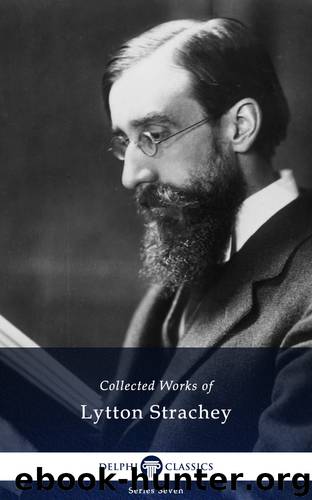Delphi Collected Works of Lytton Strachey by Lytton Strachey

Author:Lytton Strachey [Strachey, Lytton]
Language: eng
Format: epub
Tags: Delphi Main Series
ISBN: 9781786560575
Publisher: Delphi Classics
Published: 2016-09-13T04:00:00+00:00
Chorus:
“We’ll send him home and make him groan,
Oh, Al! you’ve played the deuce then;
The German lad has acted sad
And turned tail with the Russians.”
“Last Monday night, all in a fright,
Al out of bed did tumble.
The German lad was raving mad,
How he did groan and grumble!
He cried to Vic, ‘I’ve cut my stick:
To St. Petersburg go right slap.’
When Vic, ’tis said, jumped out of bed,
And wopped him with her night-cap.”
From Lovely Albert! a broadside preserved at the British Museum.
In January, 1854, it was whispered that the Prince had been seized, that he had been found guilty of high treason, that he was to be committed to the Tower. The Queen herself, some declared, had been arrested, and large crowds actually collected round the Tower to watch the incarceration of the royal miscreants.(*)
(*)”You Jolly Turks, now go to work,
And show the Bear your power.
It is rumoured over Britain’s isle
That A —— — is in the Tower;
The postmen some suspicion had,
And opened the two letters,
’Twas a pity sad the German lad
Should not have known much better!”
Lovely Albert!
These fantastic hallucinations, the result of the fevered atmosphere of approaching war, were devoid of any basis in actual fact. Palmerston’s resignation had been in all probability totally disconnected with foreign policy; it had certainly been entirely spontaneous, and had surprised the Court as much as the nation. Nor had Albert’s influence been used in any way to favour the interests of Russia. As often happens in such cases, the Government had been swinging backwards and forwards between two incompatible policies — that of non-interference and that of threats supported by force — either of which, if consistently followed, might well have had a successful and peaceful issue, but which, mingled together, could only lead to war. Albert, with characteristic scrupulosity, attempted to thread his way through the complicated labyrinth of European diplomacy, and eventually was lost in the maze. But so was the whole of the Cabinet; and, when war came, his anti-Russian feelings were quite as vehement as those of the most bellicose of Englishmen.
Nevertheless, though the specific charges levelled against the Prince were without foundation, there were underlying elements in the situation which explained, if they did not justify, the popular state of mind. It was true that the Queen’s husband was a foreigner, who had been brought up in a foreign Court, was impregnated with foreign ideas, and was closely related to a multitude of foreign princes. Clearly this, though perhaps an unavoidable, was an undesirable, state of affairs; nor were the objections to it merely theoretical; it had in fact produced unpleasant consequences of a serious kind. The Prince’s German proclivities were perpetually lamented by English Ministers; Lord Palmerston, Lord Clarendon, Lord Aberdeen, all told the same tale; and it was constantly necessary, in grave questions of national policy, to combat the prepossessions of a Court in which German views and German sentiments held a disproportionate place. As for Palmerston, his language on this topic was apt to be unbridled. At the
Download
This site does not store any files on its server. We only index and link to content provided by other sites. Please contact the content providers to delete copyright contents if any and email us, we'll remove relevant links or contents immediately.
LORD OF THE FLIES by William Golding(1835)
In the Garden of Beasts by Erik Larson(1094)
Her Majesty's Spymaster by Stephen Budiansky(1076)
Lord Of The Flies by Golding William(1069)
Homage to Catalonia by George Orwell(1011)
The Lady Penelope by Varlow Sally(1010)
Children Of England: The Heirs of King Henry VIII 1547-1558 by Weir Alison(982)
Remember Us by Martin Small(963)
Fall of the Roman Republic (Penguin Classics) by Plutarch(962)
Atomic Spy by Nancy Thorndike Greenspan(961)
Mussolini's Italy by R. J. B. Bosworth(854)
Gimson's Kings and Queens by Andrew Gimson(843)
The Last President of Europe by William Drozdiak(838)
London: A Biography by Peter Ackroyd(821)
Rome in Crisis (Penguin Classics) by Plutarch(819)
In the Garden of Beasts: Love, Terror, and an American Family in Hitler's Berlin by Erik Larson(811)
Catastrophe 1914: Europe Goes to War by Max Hastings(776)
The Twelve Caesars (Penguin Classics) by Suetonius & Robert Graves(772)
The Cousins' War - 01 - The White Queen by Philippa Gregory(770)
